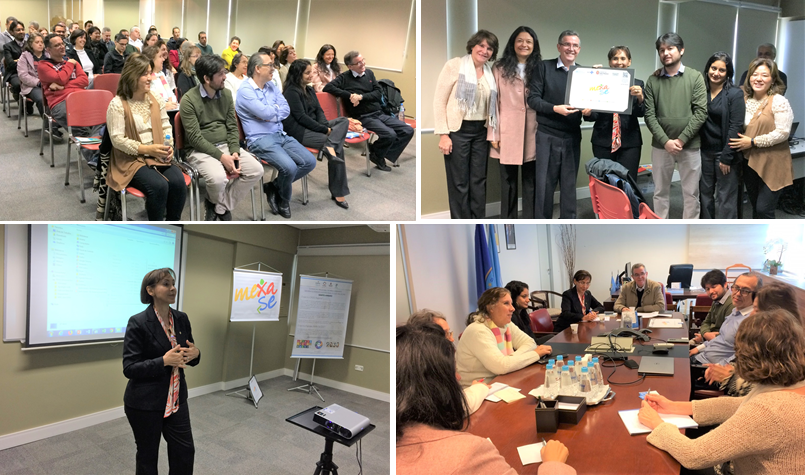The first visit of the Representative of the Pan American Health Organization/World Health Organization (PAHO/WHO) in Brazil, Dr. Socorro Gross Galiano, took place on June 6th. The PWR visited the Center’s premises and had the opportunity to be informed in detail about the Center’s organizational structure and management and get to know its collaborators.
The same day, the Sub-mayor of Santo Amaro, Janaína Lopes de Martini, and the advisors from the Conselho Municipal do Meio Ambiente, Desenvolvimento Sustentável e Cultura da Paz (CADES) of Santo Amaro were also visiting BIREME. All visitors were invited to participate at the Coffee with Ideas initiative. After a brief introduction by Dr. González on the dynamics and the purpose of the event, Ms. Janaína Lopes de Martini gave a detailed presentation on the many actions promoted by the Sub-prefeitura of Santo Amaro for attaining the objectives of the Sustainable Development Goals (SDG) and of the 2030 Agenda, particularly those related to health and to the environment, through actions that are sustainable, low-cost and have a high positive impact on the population of this part of the city.
An example are the actions for promoting physical activity at all ages, such as the “Mexa-se” campaign, inspired by the World Health Organization campaign “Let’s be active: Everyone, Everywhere, Everyday”. “Mexa-se” is promoted by the Unidade Avançada de Extensão Universitária de Santo Amaro, from the Universidade Federal de São Paulo (UNIFESP), in collaboration with the Supervisão Técnica de Saúde – Santo Amaro and Cidade Ademar, from the Prefeitura Municipal of São Paulo, in favor of Integrative and Complementary Practices in Health, Rehabilitation and Child and Adolescent Health.
The objective of these actions is to reduce physical inactivity by 10% until 2025 and by 15% until 2030. The benefits on the health of the population are direct, avoiding or reducing non-communicable diseases and promoting healthy aging. For the youth, inclusion in sports programs of diverse categories also helps to integrate them socially and culturally. CADES also contributes to the SDGs through environmentally sustainable practices, promoting awareness and education among the population on topics such as reducing the impact of daily life on the environment, reducing use of recyclables and fighting air and water pollution, thus contributing to reduce global warming.
 Next, Dr. Gross presented her strategy for PAHO Brazil, as an Epidemiology specialist and a PhD in Medicine and Surgery, with 30 years of experience in Public Health, having worked at PAHO/WHO Headquarters in Washington D.C. and in countries such as Nicaragua (where she was PWR from 2013 to 2018), Colombia, Dominican Republic and Mexico. Dr. Socorro Gross’s focus is on Primary Health Care, for which, according to her, Brazil has a unique strength: a universal and free public health system. “When we say ‘leaving no one behind’, it means that health is a right for all and not a privilege for a few. This right is built collectively, uniting efforts, competencies, determination and sacrifices”. After Dr. Gross’s speech, BIREME Director presented the current month’s activities, as is usual during the Coffee with Ideas.
Next, Dr. Gross presented her strategy for PAHO Brazil, as an Epidemiology specialist and a PhD in Medicine and Surgery, with 30 years of experience in Public Health, having worked at PAHO/WHO Headquarters in Washington D.C. and in countries such as Nicaragua (where she was PWR from 2013 to 2018), Colombia, Dominican Republic and Mexico. Dr. Socorro Gross’s focus is on Primary Health Care, for which, according to her, Brazil has a unique strength: a universal and free public health system. “When we say ‘leaving no one behind’, it means that health is a right for all and not a privilege for a few. This right is built collectively, uniting efforts, competencies, determination and sacrifices”. After Dr. Gross’s speech, BIREME Director presented the current month’s activities, as is usual during the Coffee with Ideas.
In the afternoon, in a meeting led by Dr. González, the managers of the technical fields – Services and Production of Information Sources; and Methodologies and Information Technologies – and Administrative field, as well as the Coordination of Scientific and Institutional Communication, presented their main projects, products and services, in order to inform Dr. Gross on the technical cooperation program, managerial activities and institutionality of the Center. The presentations promoted fruitful discussions and motivated a comment from Dr. Gross: BIREME should invest in marketing actions to promote its products in member countries, both within PAHO and in other institutions related to health and health education. According to Dr. Socorro Gross, “BIREME has a large intellectual and creative capital and develops products with numerous options and applications. This deserves to be better disseminated, for the benefit of all countries of the Region”.